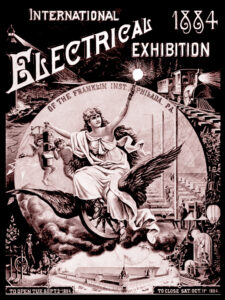About
 On Tuesday, 7 October 1884, our predecessor organization, the American Institute of Electrical Engineers (AIEE), began its first technical meeting. Held at the Franklin Institute in Philadelphia, it launched AIEE as the leading forum for sharing the latest developments in electric power and electrical communications. In 1963, AIEE merged with the Institute of Radio Engineers to form IEEE. In 2009, IEEE decreed that the first Tuesday in October shall be celebrated as IEEE Day and used to commemorate this first meeting and to build awareness of the IEEE community.
On Tuesday, 7 October 1884, our predecessor organization, the American Institute of Electrical Engineers (AIEE), began its first technical meeting. Held at the Franklin Institute in Philadelphia, it launched AIEE as the leading forum for sharing the latest developments in electric power and electrical communications. In 1963, AIEE merged with the Institute of Radio Engineers to form IEEE. In 2009, IEEE decreed that the first Tuesday in October shall be celebrated as IEEE Day and used to commemorate this first meeting and to build awareness of the IEEE community.
IEEE History Week (6 -10 Oct 2025) is an IEEE Day activity designed to increase awareness of History activities across IEEE. Organized by the IEEE History Committee in partnership with the IEEE History Center, IEEE History Week represents an opportunity for members to learn more about the history of IEEE and its fields of interest, and the wide range of IEEE history programs to which they can contribute. It also represents an opportunity for regions, sections, societies and chapters to plan and execute history-themed activities both locally and virtually, and to advertise them through the IEEE History Week website and to share news about their recent history activities.
The IEEE History Center runs the Engineering and Technology History Wiki (ETHW), a wiki-based platform that allows IEEE members and organizational units to collaboratively preserve and share their history. The Engineering and Technology History Wiki (ETHW) hosts the Milestones, Oral Histories, and Archives programs, as well an Encyclopedia and collections of first-hand histories. The Milestones Program is the History Center’s most visible program, established in 1983 to honor significant achievements in the history of electrical and electronics engineering. REACH is an IEEE History Center program that provides high school social studies teachers with free, dynamic, educational resources that will engage students by bringing to life the history of engineering through the use of multi-media. The IEEE Global Museum program promotes an understanding of electrotechnology and its impact upon society by bringing museum-quality exhibits to IEEE members and the public. The IEEE History Center conducts oral histories with leading engineers, and has posted more than 650 full-transcript histories on the Engineering and Technology History Wiki. The IEEE Archives is maintained by the IEEE History Center, a relatively small collection (approximately 15 cubic meters) of documents and other archival material that documents the history of IEEE and its predecessor organizations AIEE and IRE.
The IEEE History Center also awards the IEEE Life Members’ Fellowship in Electrical History, which supports either one year of full-time graduate work in the history of electrical science and technology at a college or university of recognized standing or up to one year of post-doctoral research, and the Pugh Young Scholar in Residence, which seeks to provide research experience for graduate students in the history of electrical and computer technologies.
Two prizes are awarded by the History Center, the IEEE William And Joyce Middleton Electrical Engineering History Award, awarded to the author of a book in the history of an IEEE-related technology that both exemplifies exceptional scholarship and reaches beyond academic communities toward a broad public audience, and the Bernard S. Finn IEEE History Prize, awarded annually for the best paper on the history of electrical technology published during the preceding year.
